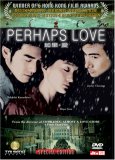| Reviews & Columns |
|
Reviews DVD TV on DVD Blu-ray 4K UHD International DVDs In Theaters Reviews by Studio Video Games Features Collector Series DVDs Easter Egg Database Interviews DVD Talk Radio Feature Articles Columns Anime Talk DVD Savant Horror DVDs The M.O.D. Squad Art House HD Talk Silent DVD
|
DVD Talk Forum |
|
|
| Resources |
|
DVD Price Search Customer Service #'s RCE Info Links |
|
Columns
|
|
|
Perhaps Love
THE MOVIE:
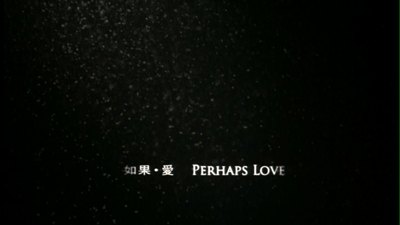
The Chinese sensation Perhaps Love is a heady blend of romance, music, and the time-bending storytelling powers of director Peter Chan, who made one of my favorite little-known treasures, Comrades: Almost a Love Story. In Perhaps Love, he breaks the fourth wall of movie musicals, using the story of a director trying to make a modern take on the old genre to examine the nature of art and how it relates to the relationships in our lives.
The story centers on a love triangle that converges on a movie set in Shanghai. Nie Wen (Jacky Cheung, Ashes of Time) is a fading auteur now in service to the moneymen who finance his pictures. He's lost his drive, and with his big star, Sun (Xun Zhou, The Banquet), about to transition to making films in Hollywood, his final commercial lifeline is running out. Insult to injury, she's his girlfriend, and their relationship is on the same rocky shores as his career.
Playing the male lead in his musical extravaganza is Lin (Takeshi Kaneshiro, House of Flying Daggers), a bankable Hong Kong star who is taking this low-paying gig against his agent's better judgment. Lin has his own reasons for his willingness to take this risk: ten years prior, he and Sun were struggling students in Beijing and were engaged to be married. Sun left him high and dry to chase fame, and he's been brooding about it ever since. He's joined this production to make her face the past she so vehemently denies.
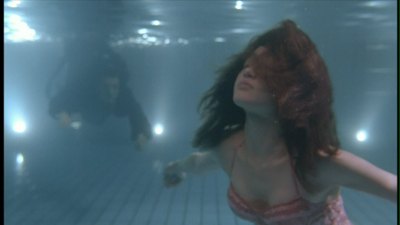
Chan works his tale along various timelines. As Lin pursues Sun in the present, we also flash back to their youth, sometimes from his point of view, sometimes from hers. The story isn't overly sympathetic to one or the other. Sun made mistakes in the past, and these clearly caused damage she's been trying to outrun; Lin makes plenty of mistakes now, discovering that love can often be ruthless and cold. As Nie Wen says once he realizes he's been caught in the middle of this, hate ends up becoming just another side of love, a way not to let go of the person who has betrayed you.
Paralleling all of this is the movie they are making. Its story involves a trapeze artist who is in love with the ringmaster who brought her under the Big Top. Upon her arrival at his circus, she had lost her memory, and he gave her a new identity. These fabricated illusions can't last forever, however, because her childhood sweetheart spots her and tries to bring her back to the reality they once knew. The trapeze girl is played by Sun, the returning love by Lin, and when his other big-name collaborator drops out--another betrayal, since Nie Wen made him a star--the director takes the part of the ringmaster himself. (There is also a second ringmaster, a kind of narrator and catch-all character played by Ji Jin-Hee, from Korean television series "A Jewel in the Palace.")
Within this second story, Chan is able to play with his central themes, tying the selfish drive of art with the selfish emotions of a love affair. He ponders the price people will pay for either, and what really motivates any of us to pursue these goals. Perhaps Love is a romance with bitterness in its heart, and it's a problem Chan refuses to cleanse with easy solutions. All of his characters have lost their way and need to rediscover what their initial passions were. The climactic music sequence, set high above the crowds and featuring acts of acrobatic daring, is quite literally about letting go in order to move on.
The movie within the movie is also where most of the musical numbers come from. Though the bulk of them are melancholy in tone, the circus setting allows Chan, Bollywood-choreographer Farah Khan, and Perhaps Love's great cinematographers, Peter Pau (Crouching Tiger, Hidden Dragon) and Christopher Doyle (In the Mood for Love), to go big with them anyway. The opening number sets the stage for the meta storytelling, using a bright cityscape reminiscent of Francis Ford Coppola's One From the Heart. The song and dance numbers at the circus feature large, Fellini-esque casts of clowns and showgirls. Some of the staging reminded me of Baz Lurhmann's Moulin Rouge, as well, with particular echoes of the "Roxanne Tango" number. Clearly, Chan, Pau, Doyle, and everyone else involved love foreign musicals, and these and many more references are lovingly crafted as a nod to the pioneers of the genre.
And yet, I don't want to give the impression that Perhaps Love is a merely gathering of influences. Peter Chan is definitely seeking his own vision, he's just using established conventions to get there. His movie is a whirlwind of narrative styles, sometimes cutting through its various story threads with lightning-quick speed. The vertiginous structure is demanding, but it's thrilling to see the layers come together. In one particularly effective scene, Lin and Sun watch their own flashback in a screening room, culminating in their embrace in the present being exactly mirrored above them in flickering light.
When you think about it, that's the essence of the movie musical: life reflected back to us in larger tones and swaths of color. Perhaps Love may not be the all-smiles Hollywood extravaganza we usually think of when we consider the genre, but that doesn't make it any less true to the form. The filmmakers here are just putting a Chinese stamp on it, their response to the musicals they love, and like the characters in their story, picking up the pieces of the past to fix up a whole new present.
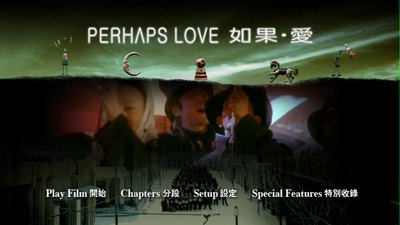
THE DVD
Video:
Perhaps Love is an all-region DVD with a widescreen anamorphic transfer. The picture quality is really good, full of wonderful colors and no artifacting or other resolution problems.
Sound:
There are two audio options for the original Mandarin soundtrack: Dolby 5.1 and DTS. The audio quality is fantastic and lush, creating a full aural atmosphere that fills the room. Surprisingly, there is also an English dub, but it only covers the dialogue, not the songs--which makes sense as far as the sound and the quality of the singing, but it has one downside. There are no automatic subtitles for the songs, and so you're going to have to manually turn them on every time the music starts and then off when the songs are done.
There are also subtitles in Traditional and Simplified Chinese, as well as English subtitles. The latter are okay. A bit of the dialogue is a little clunky and has strange language errors, which is often expected for imports--though this is a North American release, and it should be noted, better than what you'd get from your average Hong Kong title, and thus an improvement from any R2/R3 version. Plus, great care was taken with the songs, and the lyrics are translated very well, with poetic rhyme schemes that help carry the emotion of the music through. (Frank Djeng notes that the lyrics were given special consideration in the audio commentary on the disc.)
Extras:
There is an English-language audio commentary bringing together Ric Meyers, film professor and a writer who regularly covers Asian cinema; Jeff Rovin, film historian; and Frank Djeng from Tai Seng Entertainment and part of the production team bringing this movie to the U.S. The commentary covers a lot of ground, including quite a bit of background on the people both on screen and behind the scenes in Perhaps Love, historical aspects of the musical in China, and the journey of this particular film The participants often quite candidly criticize the movie in an attempt to contextualize it. I'm not quite sure if Rovin even really likes the movie all that much, to listen to him talk. To be honest, as a critic who is quite full of himself, I found it obnoxious to listen to other critics who are quite full of themselves. I'm starting to understand some of my hate mail better.
A making-of documentary is broken into two parts. Part 1 runs just under fifteen minutes and is about the decision to do a musical and the process of creating the song and dance scenes. Part two is 16 minutes, 40 seconds, and its topic is the love story. These are pretty standard no-fuss, no-muss behind-the-scenes featurettes, comprised of clips from the movie, on-set footage, and interviews. They are in Chinese with English subtitles.
Promotional materials included are two TV commercials, the Chinese and US theatrical trailers, a short music-only making-of montage (2 minutes, 15 seconds), and a music video with Jacky Cheung, mixing clips from the movie with new performance footage.
FINAL THOUGHTS:
Recommended. Perhaps Love is an ambitious piece of work, blending multiple time frames and creating a story within a story for a film musical about a film production creating a musical. Casting three Chinese performers--Takeshi Kaneshiro, Jacky Cheung, and Xun Zhou--who are well established as both actors and singers, director Peter Chan makes sure his love triangle doesn't have to struggle on the performance level. Working with an amazing cinematographer like Peter Pau, he also makes sure that the movie looks as beautiful as anything MGM made in their golden days. Yet, Perhaps Love is more complex, more challenging, and at the same time simplicity itself. A surprising little film.
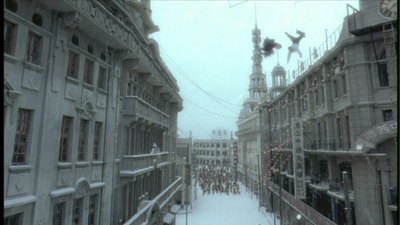
Jamie S. Rich is a novelist and comic book writer. He is best known for his collaborations with Joelle Jones, including the hardboiled crime comic book You Have Killed Me, the challenging romance 12 Reasons Why I Love Her, and the 2007 prose novel Have You Seen the Horizon Lately?, for which Jones did the cover. All three were published by Oni Press. His most recent projects include the futuristic romance A Boy and a Girl with Natalie Nourigat; Archer Coe and the Thousand Natural Shocks, a loopy crime tale drawn by Dan Christensen; and the horror miniseries Madame Frankenstein, a collaboration with Megan Levens. Follow Rich's blog at Confessions123.com.
|
| Popular Reviews |
| Sponsored Links |
|
|
| Sponsored Links |
|
|
| Release List | Reviews | Shop | Newsletter | Forum | DVD Giveaways | Blu-Ray | Advertise |
|
Copyright 2024 DVDTalk.com All Rights Reserved. Legal Info, Privacy Policy, Terms of Use,
Manage Preferences,
Your Privacy Choices | |||||||









